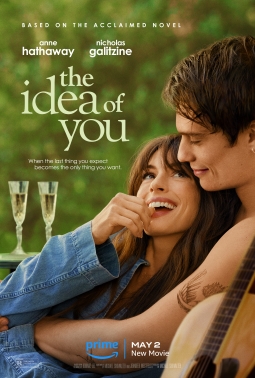“The Idea of You,” released on May 2, is a movie about the relationship between 40 year old gallery owner and divorcee Solene March and 23 year old boy band mega-celebrity Hayes Campbell. Anne Hathaway stars as Solene, with Hayes being played by rising star Nicholas Galitzine.
What sets “The Idea of You” apart from conventional romantic dramas is its fearless exploration of taboo subjects and societal norms.
The film tackles issues such as ageism, gender dynamics and societal expectations, prompting viewers to question their own beliefs and biases. Through its thought-provoking narrative, “The Idea of You” sparks important conversations about love, agency and the pursuit of happiness in a world filled with judgment and prejudice.
But in the realm of cinema, there exists a troubling tendency to dismiss movies simply because of their origin.
“The Idea of You” was based on Robinne Lee’s 2017 novel of the same name. In a 2020 interview with Vogue, Lee explained that she made the male lead of the book, Hayes, into her, “dream guy… like Prince Harry, meets Harry [Styles].”
In the same interview, Lee said, “This was never supposed to be a book about Harry Styles… It was supposed to be a story about a woman approaching 40 and reclaiming her sexuality and rediscovering herself, just at the point that society traditionally writes women off as desirable and viable and whole.”
Due to Lee’s original inspiration for the novel’s main character, the film adaptation has been branded as Harry Styles fanfiction.
This not only diminishes the creative achievements of filmmakers, but also perpetuates harmful stereotypes about women’s artistry. By overlooking the value and significance of this film, viewers undermine the diverse voices and perspectives that enrich the cultural landscape, particularly those of women.
Senior Sofie Mousing Hansen thinks that viewers should refrain from making judgements before watching the movie. “Go into ‘The Idea of You’ with an open mind. It is normalized in society that younger women date older men, but relationships in which the woman is older than the man are less common, in movies and in reality,” Mousing Hansen suggested.
Mousing Hansen also thinks that “The Idea of You” can potentially teach viewers a valuable lesson about acceptance.“It is healthy for society to see these roles in age gap relationships reversed so that we can normalize them. The movie creates an accurate depiction of how these types of relationships are stigmatized in society,” Mousing Hansen explained.
Despite the importance of the film’s message, many viewers have not been taking “The Idea of You” seriously.
In an interview with Entertainment Weekly, Lee explained why she regrets sharing Harry Styles as one of her inspirations for Hayes.
“I don’t consider [The Idea of You] fan fiction at all…Harry was one of multiple people who went into creating Hayes Campbell — he was the only one in a British boy band that was current at the time, I guess, and so that’s what people have latched onto. It’s unfortunate because it’s being used as clickbait, and when I’m writing for Hayes, I’m not picturing Harry Styles,” Lee said.
Senior Rupika Jai Ganesh does not think that it is appropriate to equate “The Idea of You” to fanfiction.
“This reductionist view not only disregards the originality and artistic merit of the film but also reflects a broader pattern of devaluing women’s contributions to the arts. It implies that stories crafted by women are somehow lesser or derivative, lacking the depth and legitimacy of those created by their male counterparts,” Jai Ganesh said.
Equating women’s work with fanfiction reinforces the notion that women’s stories are primarily for consumption by other women, as if they lack universal appeal or relevance. This narrow-minded perspective overlooks the diverse audience that appreciates and connects with women’s narratives across genders, ages and cultures.
Moreover, the dismissal of “The Idea of You” as fanfiction overlooks the unique creative process and vision of its female creators.
In an interview with The Hollywood Reporter, “The Idea of You” producer Cathy Schulman explained why Anne Hathaway decided to join the cast.
“She had mentioned to me that she wanted to do a movie that could loudly announce that she’s 40 and here to stay. She can still sparkle, still be sensual and sexual and everything. And we did shoot it in the year she was turning 40,” Schulman said.
To reduce the message of this film to fanfiction erases the agency and voice of women in the filmmaking industry.
Instead of relegating women’s art to the sidelines, viewers should celebrate and uplift it for its contributions to the cultural landscape. By recognizing the value and significance of films like “The Idea of You,” viewers can challenge outdated stereotypes and create a more inclusive and equitable environment for female artists to thrive.









